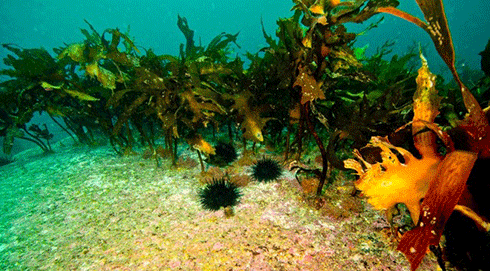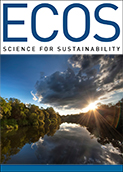
|
Published: 8 December 2014
Study of overgrazed kelp-beds shows how to avoid ecosystem ‘tipping points’
Findings from an international research study of kelp-bed collapse as a result of overgrazing by sea urchins will help future researchers identify how marine ecosystems collapse and when to step in before it’s too late.

|
|
From healthy kelp beds to a barren: the impact of sea urchins in Tasmania. Credit:
Craig Sanderson/redmap
|
In a paper just published in Philosophical Transactions B of the Royal Society, Dr Scott reported on a global study he led, assessing the dynamics of kelp bed collapse caused by sea urchin overgrazing.
The international analysis has revealed a global pattern of marine ecosystem collapse and demonstrated the difficulty of regaining lost ecosystems once tipping points have passed.
Overgrazing by sea urchins strips the sea-floor of productive and diverse kelp beds. The global analysis involved the efforts of 19 co-authors who contributed key data from 11 temperate reef systems spanning both hemispheres where kelp-bed collapse has occurred.
Dr Ling, from the University of Tasmania’s Institute for Marine and Antarctic Studies (IMAS), said that in Australia rocky reef communities have collapsed off the NSW coast, Port Phillip Bay, and northeast Tasmania as a result of sea-urchin overgrazing. However, research has shown that management measures can help protect threatened kelp beds that are otherwise intact.
‘The clear message is that natural ecosystems collapse beyond critical tipping points, and if they are pushed too far, then it can be extremely difficult to get them back,’ said Dr Ling.
‘Understanding how and why marine ecosystems collapse is essential if collapses are to be prevented and if important ecosystem services such as commercial and recreational fishing and nursery grounds are to be sustained.’
Dr Ling added that global patterns in sea urchin overgrazing confirm what he and other researchers have observed in Tasmania, and his clear message is that ‘an ounce of prevention is worth a ton of cure’.
‘Kelp beds can tolerate some increase in urchin abundance, but the system reaches a tipping point where grazing overwhelms the kelp and the reef collapses to urchin barrens. Recovering the kelp then requires almost all the sea urchins to be removed from the barrens.’
Professor Craig Johnson, also from IMAS and a co-author of the study, noted that new management arrangements designed to rebuild rock lobster populations on inshore reefs in eastern Tasmania will vastly reduce the risk of ongoing destruction of kelp beds to form extensive urchin barrens.
Dr Ling said that as human pressure on the marine environment increases, major shifts in ecosystem form and function will become more frequent.
‘Knowing when an ecosystem is approaching a tipping point can be hard to determine and so careful monitoring of ecosystem state and developing early warning systems are definitely a must for marine ecosystem science.’
Source: UTAS



